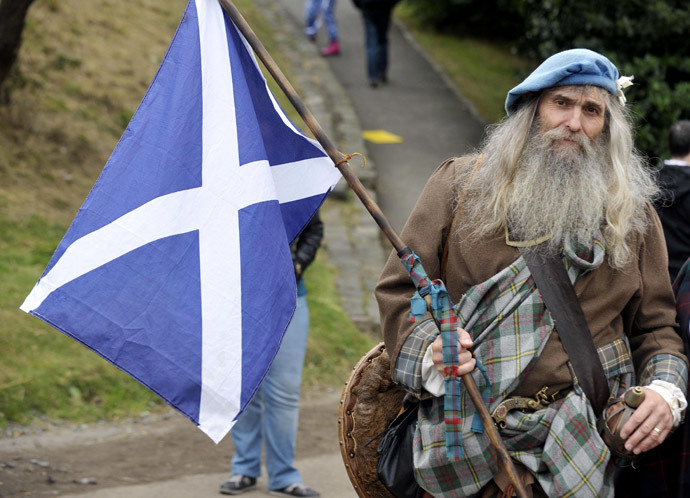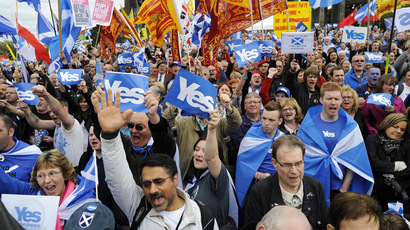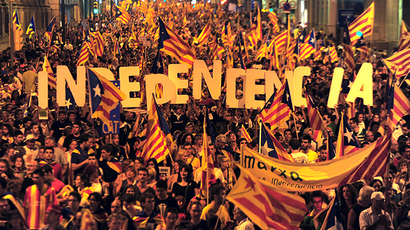Kingdom divided: Scottish independence campaign kicks off
The 16-week campaign ahead of the September referendum on Scotland’s independence has started. A pro-unity mood so far prevails, but the vote may swing with roughly a third of voters still undecided.
Scotts are to vote on whether they wish to stay part of the United Kingdom or go their own way on September 18. If secessionists from the Yes Scotland campaign turn sympathies in their favor, it would end the three-century union.
The idea is backed by the Scottish National Party (SNP), which has the majority in the Scottish parliament. But London rallied political heavyweights to confront the independence drive.
Much of the campaigning so far was about the economy and the benefits that an independent Scotland may have compared to the cost of splitting from the rest of the UK. Supporters enthuse about keeping revenues from rich oil reserves and ending what they call Westminster’s mismanagement of the Scottish economy. There is also a chance of avoiding the painful austerity measures London is taking. They estimate that Scotts would be 1,000 pounds better off every year, if the break up happens.
Unionists from the Better Together campaign warn of the negative consequences of going independent, which includes losing the stability of the British pound, problems with paying pensions and the rising cost of government debt. They figure that it would cost an extra 1,400 pounds annually for every person in Scotland to cover those costs.
Apart from the economy, pro-independence activists argue that after taking their fate in their own hands Scotts could drop British nuclear weapons deployed in their territory. The pro-union party warns that Scotland would no longer have military protection and is not guaranteed a place in the EU.
The campaign has been and remains an emotionally-loaded endeavor for both sides, which trade accusations of manipulating the voters.
“Their whole campaign has been running on trying to scare the people into voting no by saying thing like ‘you won’t be able to remain part of the European Union’ – that’s not true, you can’t take away citizenship of Europe, which Scotts have had for some three decades, it’s not possible. By saying ‘you can’t have the pound’ – it’s very unlikely that that’s going to happen. They are saying ‘your pensions will be affected’. It’s a scare story after scare story,” pro-independence political commentator Chris Bambrey told RT.
“What they are essentially trying to make people do is take a leap in the dark. There are too many unknowns for people to do that because there is no going back. That’s not a trial separation, it’s a divorce and it will be final,” said his pro-union opponent John Wight.

So far polls show that independence is favored by 30 percent of Scotland’s 4 million voters, which trails the 40 percent share of those intending to vote against it. But the margin is narrowing, and with a large portion of the population still undecided, the moods may change before September 18, when the voting takes place.
"The two governments have entered the hot phase by each trying to quantify the cash impact for ordinary Scots of voting Yes or No in September," said Charlie Jeffery, a professor of politics at the University of Edinburgh.
"What may well matter most in deciding the outcome in September is whether people think they would be better or worse off."
Meanwhile, the campaigning has been marked by some companies and organizations in Scotland insisting on a neutral stance on the issue. The latest distancing themselves from the campaigning were major UK cinema chains, who banned all referendum-related ads, citing complaints.
"Following feedback from our customers, which has been duly noted, we have taken the decision not to show any further campaign adverts,” a spokesperson for the Vue chain told The Guardian newspaper. “Along with the other leading cinema exhibitors, we will not be continuing with any additional campaigns beyond 5 June."
The feedback came mostly from the pro-independence crowd, who occasionally booed Better Together ads screened at theaters. The campaign seized the opportunity for blaming their opponents of not being able to tolerate an honest debate.
The ban however would hit the Yes Scotland campaign harder, as it was planning to roll out most of its ads at cinemas later in the summer at the peak of the campaigning.














